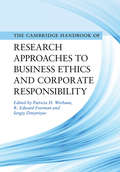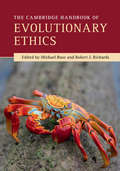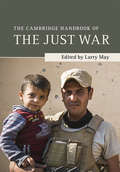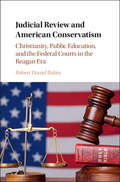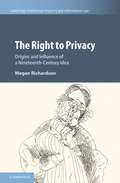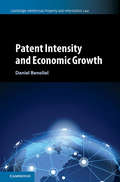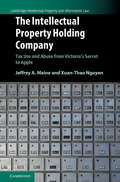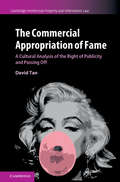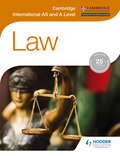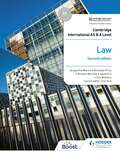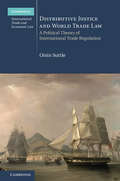- Table View
- List View
Cambridge Handbook of Research Approaches to Business Ethics and Corporate Responsibility
by Freeman Werhane Patricia H. R. Edward Sergiy DmytriyevWhile there is a large and ever-expanding body of work on the fields of business ethics and corporate social responsibility (CSR), there is a noted absence of a single source on the methodology and research approaches to these fields. In this book, the first of its kind, leading scholars in the fields gather to analyse a range of philosophical and empirical approaches to research in business ethics and CSR. It covers such sections as historical approaches, normative and behavioural methodologies, quantitative, qualitative and experimental perspectives, grounded theory and case methodologies, and finally a section on the role of the researcher in research projects. This book is a valuable and essential read for all researchers in business ethics and CSR, not only for those starting out in the fields, but also for seasoned scholars and academics.
Cambridge Handbooks in Philosophy: The Cambridge Handbook of Evolutionary Ethics (Cambridge Handbooks in Philosophy)
by Michael Ruse Richards Robert J.Evolutionary ethics - the application of evolutionary ideas to moral thinking and justification - began in the nineteenth century with the work of Charles Darwin and Herbert Spencer, but was subsequently criticized as an example of the naturalistic fallacy. In recent decades, however, evolutionary ethics has found new support among both the Darwinian and the Spencerian traditions. This accessible volume looks at the history of thought about evolutionary ethics as well as current debates in the subject, examining first the claims of supporters and then the responses of their critics. Topics covered include social Darwinism, moral realism, and debunking arguments. Clearly written and structured, the book guides readers through the arguments on both sides, and emphasises the continuing relevance of evolutionary theory to our understanding of ethics today.
Cambridge Handbooks in Philosophy: The Cambridge Handbook of The Just War
by Larry May Shannon Fyfe Eric RitterWhat makes a war just? What makes a specific weapon, strategy, or decision in war just? The tradition of Just War Theory has provided answers to these questions since at least 400 AD, yet each shift in the weapons and strategies of war poses significant challenges to Just War Theory. This book assembles renowned scholars from around the world to reflect on the most pressing problems and questions in Just War Theory, and engages with all three stages of war: jus ad bellum, jus in bello, and jus post bellum. Providing detailed historical context as well as addressing modern controversies and topics including drones, Islamic jihad, and humanitarian intervention, the volume will be highly important for students and scholars of the philosophy of war as well as for others interested in contemporary global military and ethical issues.
Cambridge Historical Studies in American Law and Society: Forging Rivals
by Reuel SchillerThe three decades after the end of World War II saw the rise and fall of a particular version of liberalism in which the state committed itself to promoting a modest form of economic egalitarianism while simultaneously embracing ethnic, racial, and religious pluralism. But by the mid-1970s, postwar liberalism was in a shambles: while its commitment to pluralism remained, its economic policies had been abandoned, and the Democratic Party, its primary political vehicle, was collapsing. Schiller attributes this demise to the legal architecture of postwar liberalism, arguing that postwar liberalism's goals of advancing economic egalitarianism and promoting pluralism ultimately conflicted with each other. Through the use of specific historical examples, Schiller demonstrates that postwar liberalism was riddled with legal and institutional contradictions that undermined progressive politics in the mid-twentieth-century United States.
Cambridge Historical Studies in American Law and Society: Gender Remade
by Sandra F. VanburkleoGender Remade explores a little-known experiment in gender equality in Washington Territory in the 1870s and 1880s. Building on path-breaking innovations in marital and civil equality, lawmakers extended a long list of political rights and obligations to both men and women, including the right to serve on juries and hold public office. As the territory moved toward statehood, however, jury duty and constitutional co-sovereignty proved to be particularly controversial; in the end, 'modernization' and national integration brought disastrous losses for women until 1910, when political rights were partially restored. Losses to women's sovereignty were profound and enduring - a finding that points, not to rights and powers, but to constitutionalism and the power of social practice as Americans struggled to establish gender equality. Gender Remade is a significant contribution to the understudied legal history of the American West, especially the role that legal culture played in transitioning from territory to statehood.
Cambridge Historical Studies in American Law and Society: Judicial Review and American Conservatism
by Rubin Robert DanielThe Christian Right of the 1980s forged its political identity largely in response to what it perceived as liberal 'judicial activism'. Robert Daniel Rubin tells this story as it played out in Mobile, Alabama. There, a community conflict pitted a group of conservative evangelicals, a sympathetic federal judge, and a handful of conservative intellectuals against a religious agnostic opposed to prayer in schools, and a school system accused of promoting a religion called 'secular humanism'. The twists in the Mobile conflict speak to the changes and continuities that marked the relationship of 1980s' religious conservatism to democracy, the courts, and the Constitution. By alternately focusing its gaze on the local conflict and related events in Washington, DC, this book weaves a captivating narrative. Historians, political scientists, and constitutional lawyers will find, in Rubin's study, a challenging new perspective on the history of the Christian Right in the United States.
Cambridge Historical Studies in American Law and Society: The Foundations of the Modern Philippine State
by Anastacio Leia CastañedaThe US occupation of the Philippine Islands in 1898 began a foundational period of the modern Philippine state. With the adoption of the 1935 Philippine Constitution, the legal conventions for ultimate independence were in place. In this time, American officials and their Filipino elite collaborators established a representative, progressive, yet limited colonial government that would modernize the Philippine Islands through colonial democracy and developmental capitalism. Examining constitutional discourse in American and Philippine government records, academic literature, newspaper and personal accounts, The Foundations of the Modern Philippine State concludes that the promise of America's liberal empire was negated by the imperative of insulating American authority from Filipino political demands. Premised on Filipino incapacity, the colonial constitution weakened the safeguards that shielded liberty from power and unleashed liberalism's latent tyrannical potential in the name of civilization. This forged a constitutional despotism that haunts the Islands to this day.
Cambridge Historical Studies in American Law and Society: The Law of the Whale Hunt
by Robert DealWhale oil lit the cities and greased the machines of the Industrial Revolution. In light of its importance, competition between whalers was high. Far from courts and law enforcement, competing crews of American whalers not known for their gentility and armed with harpoons tended to resolve disputes at sea over ownership of whales. Left to settle arguments on their own, whalemen created norms and customs to decide ownership of whales pursued by multiple crews. The Law of the Whale Hunt provides an innovative examination of how property law was created in the absence of formal legal institutions regulating the American whaling industry in the eighteenth and nineteenth centuries. Using depositions, court testimony, logbooks, and other previously unused primary sources, Robert Deal tells an exciting story of American whalers hunting in waters from the North Atlantic to the South Pacific and the Sea of Okhotsk.
Cambridge Intellectual Property and Information Law: Comparative Defamation and Privacy Law
by Andrew T. KenyonDefamation and privacy are now two central issues in media law. While defamation law has long posed concerns for media publications, the emergence of privacy as a legal challenge has been relatively recent in many common law jurisdictions outside the US. A number of jurisdictions have seen recent defamation and privacy law reforms, which have often drawn on, or reacted against, developments elsewhere. This timely book examines topical issues in defamation and privacy law focused on media, journalism and contemporary communication. Aimed at a wide legal audience, it brings together leading and emerging analysts of media law to address current and proposed reforms and the impact of changes in communication environments, and to re-examine basic principles such as harm and free speech. This book will be of interest to all those working on commonwealth or US law, as well as comparative scholars from wider jurisdictions.
Cambridge Intellectual Property and Information Law: Film Copyright in the European Union
by Pascal KaminaIntellectual property issues in the film industry are often highly complex and in today's world are evolving rapidly. In this second edition of Film Copyright in the European Union, Pascal Kamina unravels the complexities of film protection in twenty-eight member states of the European Union, including thirteen new member states who have joined since the first edition. As well as addressing key aspects of film copyright, Pascal Kamina also deals with the protection of film works within the European Union in the context of European harmonisation of copyright laws. Including a new chapter on copyright enforcement, this second edition details the substantial developments in EU law during the last decade, including major cases for the European Court of Justice, new treaties and new directives. This book will interest practitioners, academics and students. The developments on contracts and moral rights will be of particular interest to lawyers outside continental Europe.
Cambridge Intellectual Property and Information Law: International Copyright and Access to Knowledge
by Sara BannermanThe principle of Access to Knowledge (A2K) has become a common reference point for a diverse set of agendas that all hope to realize technological and human potential by making knowledge more accessible. This book is a history of international copyright focused on principles of A2K and their proponents. Whilst debate and discussion so far has covered the perspectives of major western countries, the author's fresh approach to the topic considers emerging countries and NGOs, who have fought for the principles of A2K that are now fundamental to the system. Written in a clear and accessible style, the book connects copyright history to current problems, issues and events.
Cambridge Intellectual Property and Information Law: Media Freedom as a Fundamental Right
by Jan OsterDomestic constitutions and courts applying international human rights conventions acknowledge the significance of the mass media for a democratic society, not only by granting special privileges but also by imposing enhanced duties and responsibilities to journalists and media companies. However, the challenges of media convergence, media ownership concentration and the internet have led to legal uncertainty. Should media privileges be maintained, and, if so, how is 'the media' to be defined? To what extent does media freedom as a legal concept also encompass bloggers who have not undertaken journalistic education? And how can a legal distinction be drawn between investigative journalism on the one hand and reporting on purely private matters on the other? To answer these questions, Jan Oster combines doctrinal and conceptual comparative analysis with descriptive and normative theory, and argues in favour of a media freedom principle based on the significance of the media for public discourse.
Cambridge Intellectual Property and Information Law: Origins and Influence of a Nineteenth-Century Idea (Cambridge Intellectual Property and Information Law #40)
by Megan RichardsonUsing original and archival material, The Right to Privacy traces the origins and influence of the right to privacy as a social, cultural and legal idea. Richardson argues that this right had emerged as an important legal concept across a number of jurisdictions by the end of the nineteenth century, providing a basis for its recognition as a universal human right in later centuries. This book is a unique contribution to the history of the modern right to privacy. It covers the transition from Georgian to Victorian England, developments in Second Empire France, insights in the lead up to the Brgerliches Gesetzbuch (BGB) of 1896, and the experience of a rapidly modernising America around the turn of the twentieth century. It will appeal to an audience of academic and postgraduate researchers, as well as to the judiciary and legal practice.
Cambridge Intellectual Property and Information Law: Patent Intensity and Economic Growth (Cambridge Intellectual Property and Information Law #38)
by Daniel BenolielEconomic growth has traditionally been attributed to the increase in national production arising from technological innovation. Using a panel of seventy-nine countries bridging the North-South divide, Patent Intensity and Economic Growth is an important empirical study on the uncertain relationship between patents and economic growth. It considers the impact of one-size-fits-all patent policies on developing countries and their innovation-based economic growth, including those policies originating from the World Intellectual Property Organization, the World Trade Organization and the World Health Organization, as well as initiatives derived from the TRIPS Agreement and the Washington Consensus. This book argues against patent harmonization across countries and provides an analytical framework for country group coalitioning on policy at UN level. It will appeal to scholars and students of patent law, national and international policy makers, venture capitalist investors, and research and development managers, as well as researchers in intellectual property, innovation and economic growth.
Cambridge Intellectual Property and Information Law: Tax Use and Abuse from Victoria's Secret to Apple (Cambridge Intellectual Property and Information Law)
by Jeffrey A. Maine Xuan-Thao NguyenMany companies that have become household names have avoided billions in taxes by 'parking' their valuable intellectual property assets in holding companies located in tax-favored jurisdictions. In the United States, for example, many domestic companies have moved their IP to tax-favored states such as Delaware or Nevada, while multinational companies have done the same by setting up foreign subsidiaries in Ireland, Singapore, Switzerland, and the Netherlands. In this illuminating work, tax scholar Jeffrey A. Maine teams up with IP expert Xuan-Thao Nguyen to explain how the use of these IP holding companies has become economically unjustified and socially unacceptable, and how numerous calls for change have been made. This book should be read by anyone interested in how corporations - including Gore-Tex, Victoria's Secret, Sherwin-Williams, Toys-R-Us, Apple, Microsoft, and Uber - have avoided tax liability with IP holding companies and how different constituencies are working to stop them.
Cambridge Intellectual Property and Information Law: Test Tubes for Global Intellectual Property Issues
by Susy FrankelSmall market economies provide a valuable insight into how a country might balance competing interests in global intellectual property. As developed countries that are also net-importers of intellectual property, small market economies have similar concerns to some developing countries. This duality of developed and developing country interests has resulted in some innovative ways of calibrating laws so that they both support national economic and social needs and honour international commitments. In this book, Susy Frankel uses examples from the small market economies of Singapore, New Zealand and Israel to address global intellectual property issues. Those issues include approaching treaty interpretation to both assist in implementation of obligations and utilisation of flexibilities, and effective dispute resolution; the links between trade and innovation; when and how patent and copyright law can be flexible; the importance of trade marks to small businesses; parallel importing; and the protection of traditional knowledge.
Cambridge Intellectual Property and Information Law: The Commercial Appropriation of Fame
by David TanCelebrities can sell anything from cars to clothing, and we are constantly fascinated by their influence over our lifestyle choices. This book makes an important contribution to legal scholarship about the laws governing the commercial appropriation of fame. Exploring the right of publicity in the US and the passing off action in the UK and Australia, David Tan demonstrates how an appreciation of the production, circulation and consumption of fame can be incorporated into a pragmatic framework to further the understanding of the laws protecting the commercial value of the celebrity personality. Using contemporary examples such as social media and appropriation art, Tan shows how present challenges for the law may be addressed using this cultural framework. This book will be of interest to intellectual property law academics, judges, practitioners and students in the US and common law jurisdictions, as well as those in the field of cultural studies.
Cambridge Intellectual Property and Information Law: Trademark and Unfair Competition Conflicts
by Dornis Tim W.With the rise of internet marketing and e-commerce around the world, international and cross-border conflicts in trademark and unfair competition law have become increasingly important. In this groundbreaking work, Tim Dornis - who, in addition to his scholarly pursuits, has worked as an attorney, a public prosecutor, and a judge, giving him experience in both civil and common-law jurisdictions - presents the historical-comparative, doctrinal, and economic aspects of trademark and unfair competition conflicts law. The book should be read by any scholar or practitioner interested in the international aspects of intellectual property generally, and trademark and unfair competition law specifically. This title is available as Open Access.
Cambridge International AS and A Level Law
by Jacqueline MartinWe are working with Cambridge International Examinations to gain endorsement for this Student's Book, which offers content in the same order as the latest syllabus and insight from expert authors on every paper.- Ensures relevance with up-to-date case examples from around the world- Gets students focusing on key elements and thinking about Law in the right way with expert tips throughout- Prepares students for assessment with examination questions
Cambridge International AS and A Level Law Second Edition
by Jacqueline Martin Nicholas Price Richard Wortley Jayne Fry Tim WilshireWe are working with Cambridge Assessment International Education to gain endorsement for this forthcoming title. Build strong subject knowledge and skills with the only published course to offer full and comprehensive coverage of the syllabus for examination from 2023.-Engage with relevant and up-to-date case examples to illustrate key topics. - Build knowledge with key elements covered and skills-targeted activities throughout.- Test understanding with a range of activities and exam-style questions.- Extend learning with Internet research boxes providing opportunities to delve further into topics.
Cambridge International AS and A Level Law Second Edition
by Jacqueline Martin Nicholas Price Richard Wortley Jayne Fry Tim WilshireWe are working with Cambridge Assessment International Education to gain endorsement for this forthcoming title. Build strong subject knowledge and skills with the only published course to offer full and comprehensive coverage of the syllabus for examination from 2023.-Engage with relevant and up-to-date case examples to illustrate key topics. - Build knowledge with key elements covered and skills-targeted activities throughout.- Test understanding with a range of activities and exam-style questions.- Extend learning with Internet research boxes providing opportunities to delve further into topics.
Cambridge International Trade and Economic Law: A Political Theory of International Trade Regulation (Cambridge International Trade and Economic Law #36)
by Oisin SuttleWhat does justice demand in international trade regulation? And how far does World Trade Organization (WTO) law respond to those demands? Whether our focus is developing countries, struggling industries, or environmental protection, distributive conflict is a pervasive feature of international economic law. Despite this, we lack an adequate theory of distributive justice for this domain. Drawing on philosophical approaches to global justice, this book advances a novel theory of justice in trade regulation, and applies this to explain and critique the law of the WTO. Integrating theoretical and doctrinal approaches, it demonstrates the potential for political theory to illuminate and inform the progressive development of WTO law, including rules on border measures, discrimination, trade remedies and domestic regulation. Written from an interdisciplinary perspective, accessible to lawyers, philosophers and political scientists, the book will appeal both to theorists interested in building bridges from theory to practice, and practitioners seeking new perspectives on existing problems.
Cambridge International Trade and Economic Law: Developing Countries and Preferential Services Trade
by Charlotte Sieber-GasserWTO law sets the global minimum standards for trade regulation, while allowing some regulatory flexibility for developing countries. The exact scope of regulatory flexibility is often unclear and, at times, flexibility may be counterproductive to sustainable economic growth in developing countries. Undisputedly, developing countries would have some flexibility with respect to tailoring preferential services trade agreements to their individual economic needs and circumstances, but empirical data from over 280 preferential services trade agreements worldwide shows that this flexibility is rarely used. This volume clarifies the regulatory scope of flexibility for preferential services trade agreements between developing countries by linking the legal interpretation of WTO law with evidence from research in economics and political sciences. The book suggests that the current regulatory framework leaves room for meaningful flexibility for developing countries, and encourages policymakers and scholars to take these flexibilities into consideration in their design and study of trade policies.
Cambridge International Trade and Economic Law: Establishing Judicial Authority in International Economic Law
by Joanna Jemielniak Jemielniak, Joanna and Nielsen, Laura and Olsen, Henrik Palmer Laura Nielsen Henrik Palmer OlsenA central development in international law is the intensified juridification of international relations by a growing number of international courts. With this in mind, this book discusses how international judicial authority is established and managed in key fields of international economic law: trade law, investor-state arbitration and international commercial arbitration. Adopting a unique legal-centric approach, the analysis explores the interplay between these areas of economic dispute resolution, tracing their parallel developments and identifying the ways they influence each other on processual mechanisms and solutions. Drawing together contributions from many leading scholars across the world, this volume considers issues such as the usage of precedent and the role of legitimacy, suggesting that the consolidation of judicial authority is a universal trend which impacts on state behaviour.
Cambridge International Trade and Economic Law: Export Restrictions on Critical Minerals and Metals
by Ilaria EspaConventional wisdom on the insufficiency of existing WTO disciplines on export restrictions has triggered momentum on the issue. In this book, Ilaria Espa offers a comprehensive analysis of the scope and coverage of WTO disciplines on export restrictions in light of emerging case law. She investigates whether such rules still provide a sufficient, credible and effective framework capable of preventing abuses in the use of export restrictive measures on critical minerals and metals during a period of economic crisis and change in international trade patterns. Giving a broad overview of the export restrictions applied to these materials, Espa identifies distinctive features in the proliferation of export barriers and analyses the existing WTO rules to reveal their scope, gaps and inconsistencies. She goes on to present solutions based upon her findings with the aim of bringing more coherence and equity to WTO rules on the export side.
